Let’s say you’re at a fast food restaurant and you have a few french fries left over and a gull is eagerly staring at you and the fries. Do you toss the bird your leftovers? What if you are eating a sandwich on a park bench and a pigeon walks over and waits for your crumbs? And if you have a small kid and are in the vicinity of some ducks and geese? Do you feed the birds then?
It seems like the people that run an awful lot of parks don’t want you feeding the birds. Some parks offer pretty darn good reasons for it too.
Let’s take the issues raised in the sign above one by one and figure out how serious each issue is.
Regular feeding can cause:
- Unnatural Behavior – There is no doubt that feeding birds causes unnatural behavior. Wild birds should not be coming up to people looking for food. The behavior could be especially disastrous for waterfowl, which are hunted by people, but less so for passerines, or perching birds, which regularly come into people’s bird feeders.
- Pollution – I suppose that if regular feeding was taking place that the excess nutrients could cause problems, especially in a small body of water. Also, if lots of ducks and geese gather in a spot where they don’t normally the amount of bird poop could certainly be a problem.
- Overcrowding – Again, with regular feeding taking place it seems likely that lots more birds than normal could show up and overwhelm a local ecosystem.
- Delaying Migration – I really, really, really, doubt that this is the case. I’ve not seen any study that shows that feeding migratory birds delays their migration. If anyone has, please share it in the comments.
- Poor Nutrition and Disease – If there is pollution and overcrowding then the risk of disease would certainly increase. Also, the bread that many use to feed waterfowl does not really meet a wild bird’s nutritional needs. This seems like the strongest case against feeding wild waterfowl.
- Closure of Bathing Beaches – If there are lots of birds and they cause bacteria levels to rise because of their poop then this could be a negative side effect. Of course, this doesn’t bother the birds but it does bother people. Has anyone ever heard of a beach being closed due to an excess of birds that were being fed though? If so, please share it in the comments.
Here’s the thing – I have fed birds, and not just seed from backyard feeders, which it seems that no one wants to take on and prevent.* I have been known, on occasion, to feed ducks and gulls, especially with my son who, at age two, loves seeing birds up close. And any birder who has ever gone on a pelagic trip has seen chumming, where food is thrown overboard to attract birds to the boat. The former is worse than the latter, though in some jurisdictions both would actually be considered illegal. It seems that a having a set place, like a small pond, where people regularly come to feed birds is the worst-case scenario, because the accumulation of nutrients and waste can really wreck water quality, cause overcrowding and disease, and make a park an unattractive place. Chumming from the back of a boat as it motors through the wide-open ocean doesn’t have the same negative effect because the nutrients are spread out and the birds don’t congregate for any length of time in one place.
The more I think about this issue the more I realize that I really shouldn’t be going to local parks and tossing bread to birds, as much fun as it is for my son. We can find other ways to get him up close to birds, like visiting a local farm, getting him to responsible zoos, or just taking him out to places where other people feed birds.
In my neighborhood and across New York City, there are quite a few places with signs like the one above. New Yorkers love feeding pigeons and other New Yorkers love to hate pigeons and those that feed them. And while I see no real harm offering an introduced bird that is at home in the city some crumbs from lunch I do take issue with the slightly disturbed folks who compulsively leave huge amounts of food in set places on a regular schedule. For example, there is a woman that drives into my neighborhood and leaves a heap of rice, bread, and other assorted food on a street corner regularly. That stretch of sidewalk is disgusting because of the unnatural number of birds and their waste and it sucks to have to walk past it with a two-year-old who likes to touch everything.
What’s your take on feeding wild birds? Just from feeders? Any time, any place? What are the positive and negative effects that you have noticed?
…
*In fact, there are several studies that show that birds with access to bird feeders fledge more young than those without. Of course,bird feeders should be cleaned regularly to prevent disease from being a problem.
………












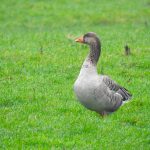
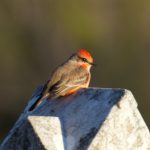
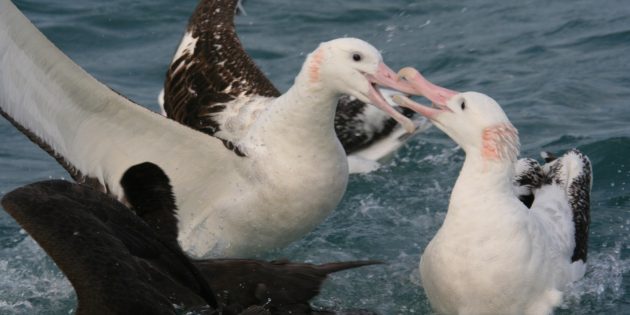
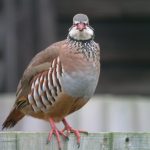
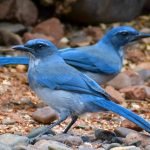
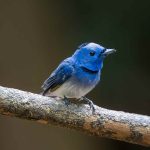
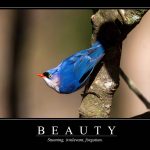
A touchy subject. I’ve been against feeding ducks for the better reasons you’ve mentioned, but it is so ingrained in our society and the most common way people get to appreciate the environment. I am highly for continuing to train the titmice in central park to eat seeds from the hand, despite whatever reasons against. Feeding pigeons is a strange hobby, but I think the worst reason not to is that excess food feeds rats.
To add to your “*”, I heard there are some counties that prohibit all bird feeding as it causes all sorts of horrible yet improbable diseases.
There is a frequent problem at Green Lake in Seattle, one of our larger urban recreational lakes, with “swimmer’s itch”, caused by a parasite in duck and goose droppings. This is directly tied to people feeding the birds and resulting overpopulation.
There’s a nice little article on Tetrapod Zoology on why feeding ducks (especially the time-honored tradition of feeding ducks bread) actually is bad for them: http://blogs.scientificamerican.com/tetrapod-zoology/2012/01/20/stop-feeding-the-ducks/
I wish I’d taken a pic of the sign we saw at a McDonald’s in Newfoundland (I think in Corner Brook). It said “Don’t Feed the Gulls” and had a drawing of a young child that appeared to be about to be killed by a gull. Kind of funny in its apparent hyperbole, but then you turn around and see a gang of almost-eagle-sized Great Black-backed Gulls standing there waiting for french fries. If someone sent a toddler out there with a few fries, it would not be pretty.
I don’t approve of feeding birds inappropriate food. Giving bread to waterfowl and feeding bags of store-bought salted popcorn to gulls aren’t good choices. One local location where people used to feed the ducks a lot ended up having problems with the ducks dying several years back. The disease was blamed on rotting bread fouling the water combined with a concentration of ducks in a small area.
I don’t think it is a good idea to teach wild creatures to come to humans for food either. Too often it results in problems for the creatures and sometimes for people. I don’t have a problem with putting out appropriate food for birds in properly cleaned feeders.
Portland Audubon has a good (but brief) webpage about this issue. I think the problem is exacerbated by the release of domestic ducks and geese which don’t have any wish to migrate nor do they behave like wild birds. http://audubonportland.org/backyardwildlife/brochures/waterfowl There’s also a story about the duck/goose roundup at a local park. http://www.oregonlive.com/portland/index.ssf/2011/09/at_westmoreland_park_the_domes.html
I would like to comment about feeding seagulls at beaches. The couple of times my family and I have vacationed in Florida, I see signs out prohibiting the feeding of the birds. I find it inconsiderate that while we’re laying on the beach, people pick a spot near us to feed the birds. And I’m not talking just one crumb. They’re throwing crusts around them to attract them. Seagulls from ALL over start flocking where we’re relaxing. They fly above our heads & it’s just a matter of time before one of them dive bombs us with poop. How am I supposed to relax when at any time I could be dumped on? We’re not talking just four or five birds. I’m talking about a large flock constantly hovering above us while they “wait their turn” to be fed. I really don’t know if the bread is ultimately good for the birds or not, but if if someone is intending to feed birds such as seagulls, please leave some space. Thanks for reading my comment, Cory.
Children need to be taught to murder animals, not feed them!!!
@Tim: I’m assuming that is a sarcastic comment because if not, wow.
if anyone thinks migration is not delayed by a continual food source, come to new jersey and visit our flocks of canada geese that have made nj their year-round home. they breed several times a year and crap everywhere, including lawns where children play as well as open garbage cans looking for more food. if you leave the door open, they’ll walk right in.
parks are unwalkable for fear of sliding on goose-shit and if you don’t feed them, they attack en masse. it’ illegal to feed them and it’s people like you who we can thank for the unmanagable numbers we now have to deal with.
please invite them to your house.
Tim, I do not find that funny at all. If you really meant it than you should go to jail for recommending animal cruelty.
But then again, people kill animals to eat and, man, do I love beef pies.
Poor cows, LOL. ( ;